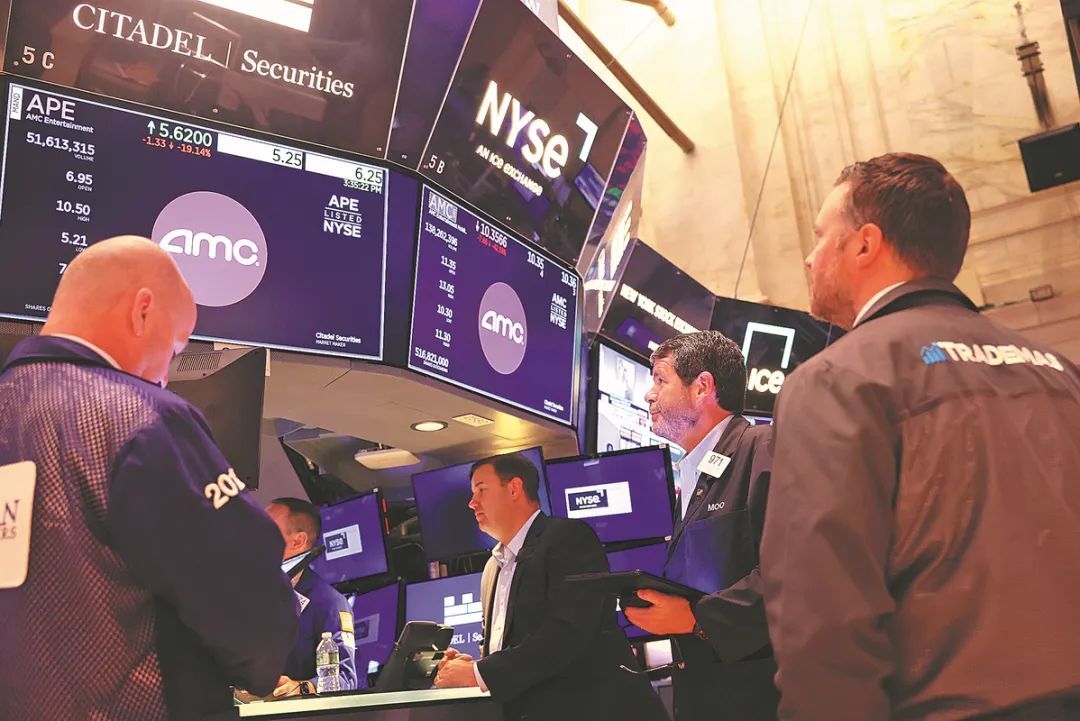Aggressive and irresponsible financial policies adopted by the United States have triggered significant inflation worldwide, causing widespread economic disruption and a significant rise in poverty, especially in the developing world, global experts say.
In battling to contain runaway US inflation, which topped 9 percent in June, the US Federal Reserve has raised interest rates four times to the current level of a range of 2.25 to 2.5 percent.
Benyamin Poghosyan, chairman of the Center for Political and Economic Strategic Studies in Yerevan, Armenia, told China Daily that the rises have disrupted global financial markets, with many developing countries facing record-high inflation, hobbling their attempts to find financial resilience in the face of various international challenges.
"It has already resulted in significant devaluation of the euro and some other currencies, and it will continue to stoke inflation," he said.

Consumers shop for meat at a Safeway grocery store as inflation continues to grow in Annapolis, Maryland
In Tunisia, a strong dollar and sharp rises in grain and energy prices are expected to widen the country's budget deficit to 9.7 percent of GDP this year from a previously forecast 6.7 percent, said the central bank governor Marouan Abassi.
By the end of this year the country's outstanding public debt is forecast to reach 114.1 billion dinars ($35.9 billion), or 82.6 percent of its GDP. Tunisia is heading for default if the current deterioration in its finances continues, the investment bank Morgan Stanley warned in March.
Turkiye's annual inflation reached a record high 79.6 percent in July, the highest in 24 years. One dollar was traded at 18.09 Turkish liras on Aug 21, marking a loss in value of 100 percent compared with a year ago, when the exchange rate was 8.45 liras to the dollar.
Despite government efforts including raising the minimum wage to protect people from financial woes sparked by high inflation, Turks are struggling to make ends meet.
Tuncay Yuksel, a thrift shop owner in Ankara, said his family had crossed food products such as meat and dairy off grocery lists because of soaring prices since the start of the year.
"Everything has become more expensive, and the purchasing power of citizens has dropped considerably," Xinhua News Agency quoted Yuksel as saying. "Some people cannot afford to buy basic needs."
The US Fed's interest rate rises have "definitely caused inflation in the developing world", and the move is irresponsible, Poghosyan said.
"The US is using dollar hegemony to pursue its geopolitical interests. The US should bear responsibility for its actions, especially as the US portrays itself as the global defender of human rights that cares about everyone.
"It makes the lives of tens of millions of people more miserable, but I believe the US simply doesn't care."
Jerome Powell, the chairman of the US Federal Reserve, warned on Aug 26 that the US is likely to impose larger interest rate rises in coming months and is determined to tame the highest inflation in 40 years.
Tang Yao, associate professor in the Guanghua School of Management at Peking University, said reducing inflation is Washington's first priority so the Fed is expected to keep lifting rates for most of the coming year.
This would trigger a global liquidity crunch, stimulating a significant flow of capital from global markets into the US and devaluation of many other currencies, Tang said, adding that the policy would also cause the stock and bond market to decline and countries with weak economic and financial fundamentals to bear more risks such as increased debt defaults.
The International Monetary Fund has also warned that the Fed's attempts to combat price pressures could hit emerging markets loaded with foreign currency debt.
"A disorderly tightening of global financial conditions would be particularly challenging for countries with high financial vulnerabilities, unresolved pandemic-related challenges and significant external financing needs," it said.

Spillover effect
Wu Haifeng, executive director of the Fintech Center of Shenzhen Institute of Data Economy, also raised concerns on the spillover effect of the Fed's policy, saying it brings uncertainties and chaos to international markets and hits many economies hard.
Raising interest rates has not reduced domestic inflation of the US effectively, nor eased the country's consumer prices, Wu said.
US consumer price inflation rose 9.1 percent over the 12 months to June, the fastest increase since November 1981, according to official figures.
However, the US is unwilling to acknowledge all this and work with other countries to boost globalization because it does not want to move against vested interests including the rich and the military-industrial complex, Wu said.
Tariffs imposed on China, for example, or any sanction on other countries, have no effect other than making US consumers spend more and threaten the US economy, Wu said.
Experts see imposing sanctions as another way for the US to shore up its dollar hegemony.
Since the establishment of the Bretton Woods system in 1944 the US dollar has assumed the role of the global reserve currency, and over the decades the US has retained its position as the world's number one economy.
However, the 2008 world financial crisis marked the beginning of the end of absolute US hegemony. US decline and "the rise of others", including China, Russia, India and Brazil, have challenged US primacy, Poghosyan said
As the US started to face growing competition from other centers of power, it decided to exploit the role of the dollar as a global reserve currency in its efforts to contain the rise of others and preserve US hegemony.
Using the position of the dollar, the US threatened countries and companies, saying it would cut them from the international financial system if they did not follow the US policy, he said.
"The first victim of this policy was Iran, which was put under severe economic sanctions," Poghosyan said. "Then the US decided to use this policy of sanctions against China, particularly against Chinese telecommunications companies, such as Huawei and ZTE, which were significant competitors for the American IT giants in areas such as 5G networks and artificial intelligence."

Geopolitical tool
The US government uses the dollar more and more as a primary tool to advance its geopolitical interests and contain the rise of others, trust in the dollar is declining, and many developing countries are keen to abandon it as the primary currency for trade, Poghosyan said.
"Those countries should elaborate mechanisms to decrease their dependency on the US dollar, otherwise they will be under constant US threat to destroy their economies."
Tang of the Guanghua School of Management suggested that developing economies should diversify in trade and finance by increasing the number of major trading partners and sources of financing and investment destinations, in an effort to reduce their dependence on the US economy.
The de-dollarization would be difficult in short- and medium-term but a vibrant and diversified global financial market and currency system could reduce reliance on the US dollar and stabilize the international financial order, Tang said.
Many countries have decreased the amount of US debt they hold and have started to diversify their foreign exchange reserves.
The Bank of Israel announced in April that it has added the currencies of Canada, Australia, Japan and China to its foreign exchange reserves, which were previously limited to the US dollar, the British pound and the euro.
US dollars account for 61 percent of the country's foreign reserve portfolio, compared with 66.5 percent previously.
Egypt's central bank has also maintained a diversified portfolio strategy by buying 44 metric tons of gold in the first quarter of this year, a 54-percent increase, the World Gold Council said.
Other countries such as India and Iran are discussing the possibility of using national currencies in their international trade.
Iran's Supreme Leader Ayatollah Ali Khamenei called in July for a gradual abandonment of the dollar in bilateral trade with Russia. On July 19 the Islamic republic launched rial-rouble trading in its foreign exchange market.
"The dollar still preserves its role as a global reserve currency, but the process of de-dollarization has started to accelerate," Poghosyan said.
Also, the transformation of the post-Cold War order will inevitably result in the establishment of a multipolar world and the end of absolute US hegemony, he said.
Post time: Sep-05-2022




